Basil, a popular herb known for its aromatic flavor and medicinal properties, has been widely used in cuisines and traditional medicine for centuries.
However, despite its popularity and versatility, basil leaves can sometimes develop a concerning change in color – turning black. This unexpected transformation can be a cause of worry for gardeners, cooks, and health enthusiasts alike. Here we will delve into the reasons behind basil leaves turned black, the potential implications of this change, and the steps that can be taken to prevent or remedy the issue.
Whether you are growing basil in your garden or using it in your cooking, understanding the causes and solutions for blackened basil leaves is essential for maintaining the quality and health benefits of this beloved herb.
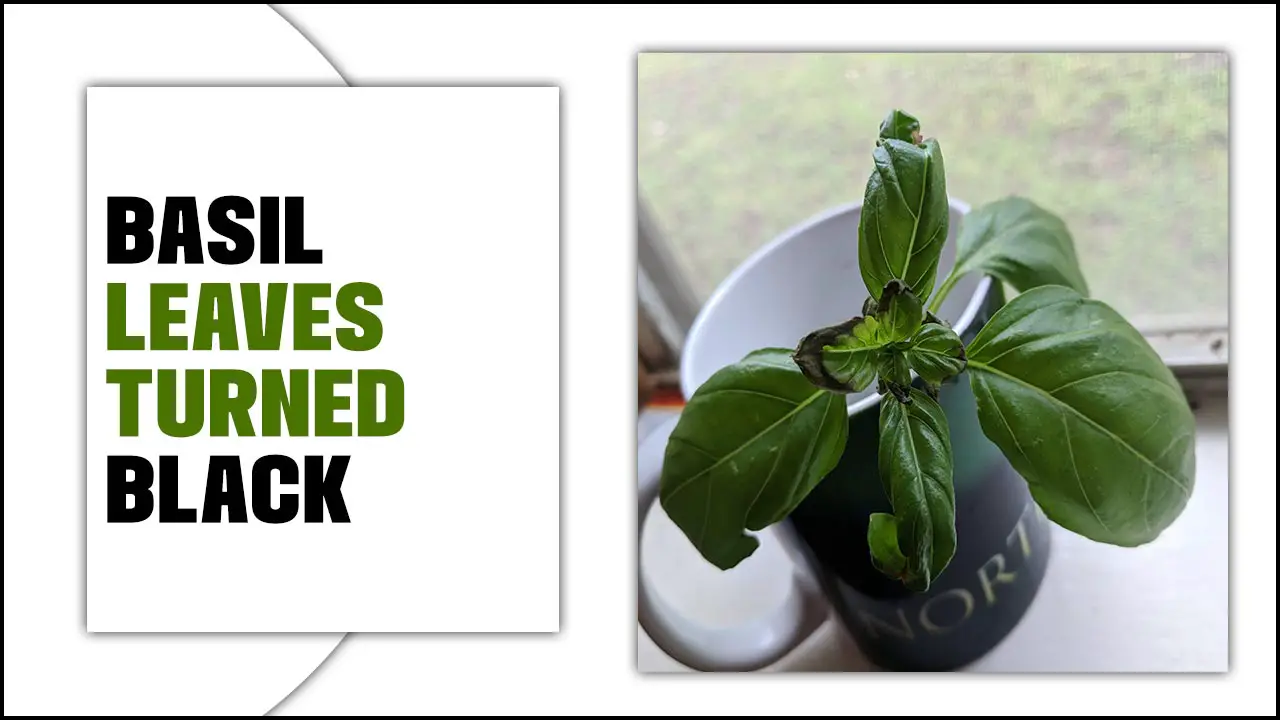
Behind The Reason Why Basil Leaves Turned Black?
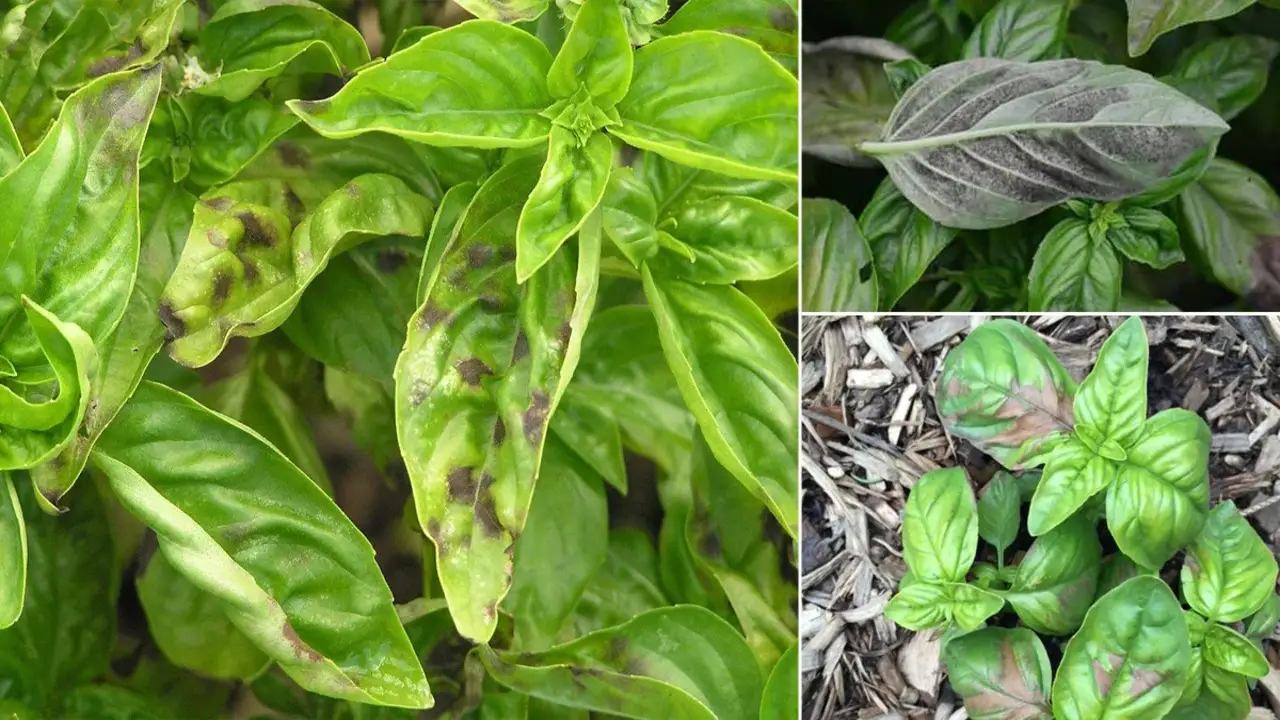
If you’ve noticed that your basil leaves turned black, it can be a cause for concern. There are a few reasons why this might be happening. One possibility is that the basil plant has been exposed to extreme temperatures or has experienced frost damage.
Cold temperatures can cause the leaves to turn black and become wilted. Another potential reason is a fungal or bacterial infection. Diseases like downy mildew or bacterial leaf spot can cause the leaves to develop dark spots or turn completely black.
Overwatering or poor drainage can also lead to root rot, which can cause the leaves to turn black and eventually die off. It’s important to assess the growing conditions and address any issues promptly to prevent further damage to your basil plant.
Overwatering And Poor Drainage A Causes Of Blackened Basil Leaves
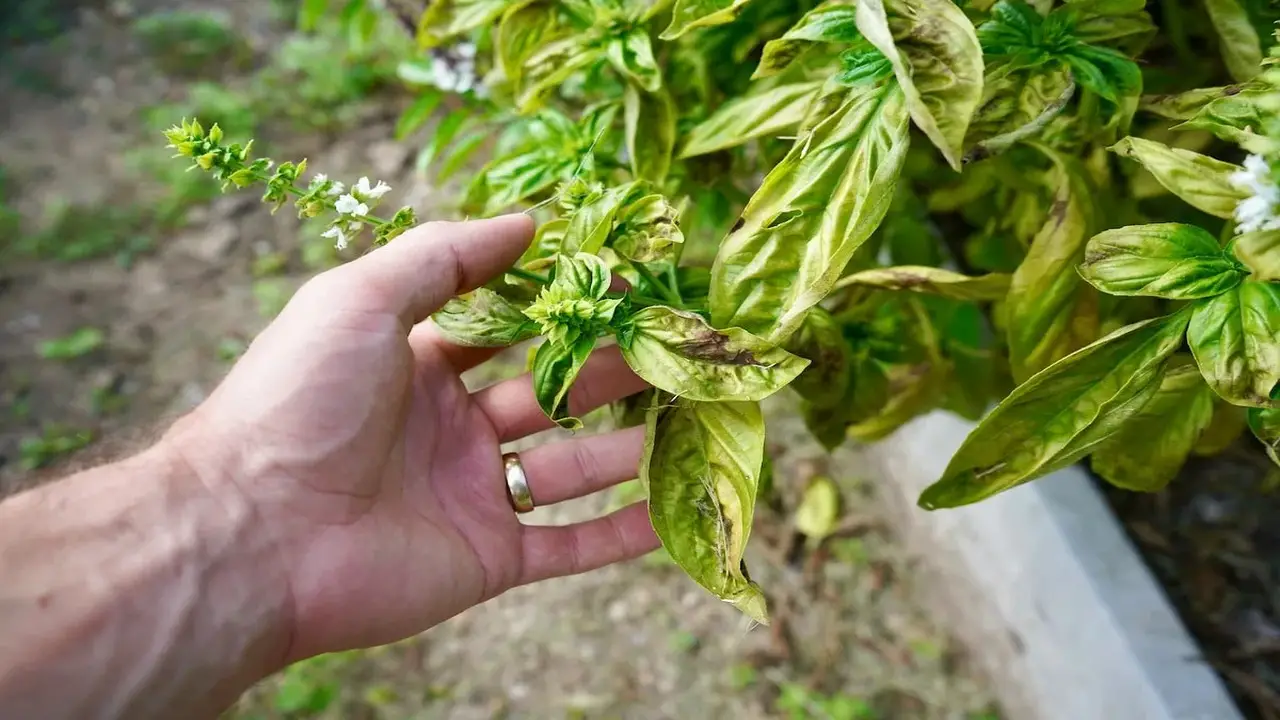
Overwatering and poor drainage are common culprits behind blackened basil leaves. When basil plants are overwatered, it can lead to root rot and deprive them of oxygen, resulting in black leaves. Similarly, poor drainage can cause waterlogged soil, suffocating the roots and leading to blackened leaves.
Excess moisture from overwatering can also create a favorable environment for fungal diseases, further darkening the leaves. To prevent blackened basil leaves, it’s important to practice proper watering techniques and ensure good drainage by using well-draining soil and pots with drainage holes.
Fungal Diseases And Pathogens That Affect Basil Plants
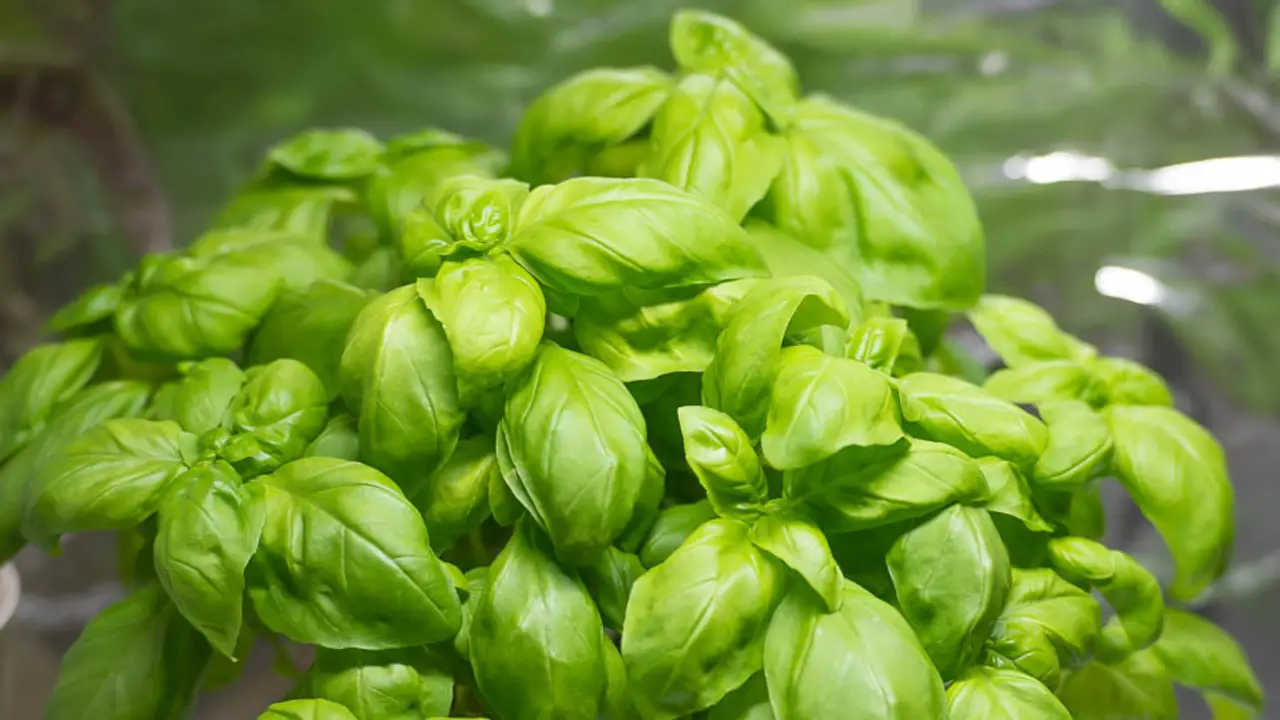
Fungal diseases like downy mildew and fusarium wilt can cause dark spots and blackening on the leaves of your basil plant. Pathogens, such as bacteria or viruses, can also lead to black spots on the basil leaves. It’s important to ensure good air circulation and avoid overwatering to prevent these fungal infections, as wet leaves are more susceptible to fungal diseases. Regularly inspecting your basil plants for any signs of disease and using organic fungicides or natural remedies like neem oil can help control and treat these fungal diseases.
Pests And Insects That Can Damage Basil Leaves
Aphids, whiteflies, caterpillars and slugs are common pests that can damage basil leaves, potentially causing them to turn black. Additionally, fungal diseases like downy mildew can lead to the development of black spots on basil leaves.
Regularly inspecting your basil plants and promptly removing any pests or insects can help prevent damage to the leaves. Proper watering techniques and good air circulation can also go a long way in preventing fungal diseases that may result in blackened basil leaves.
Sunburn And Heat Stress As Potential Causes Of Blackened Basil Leaves
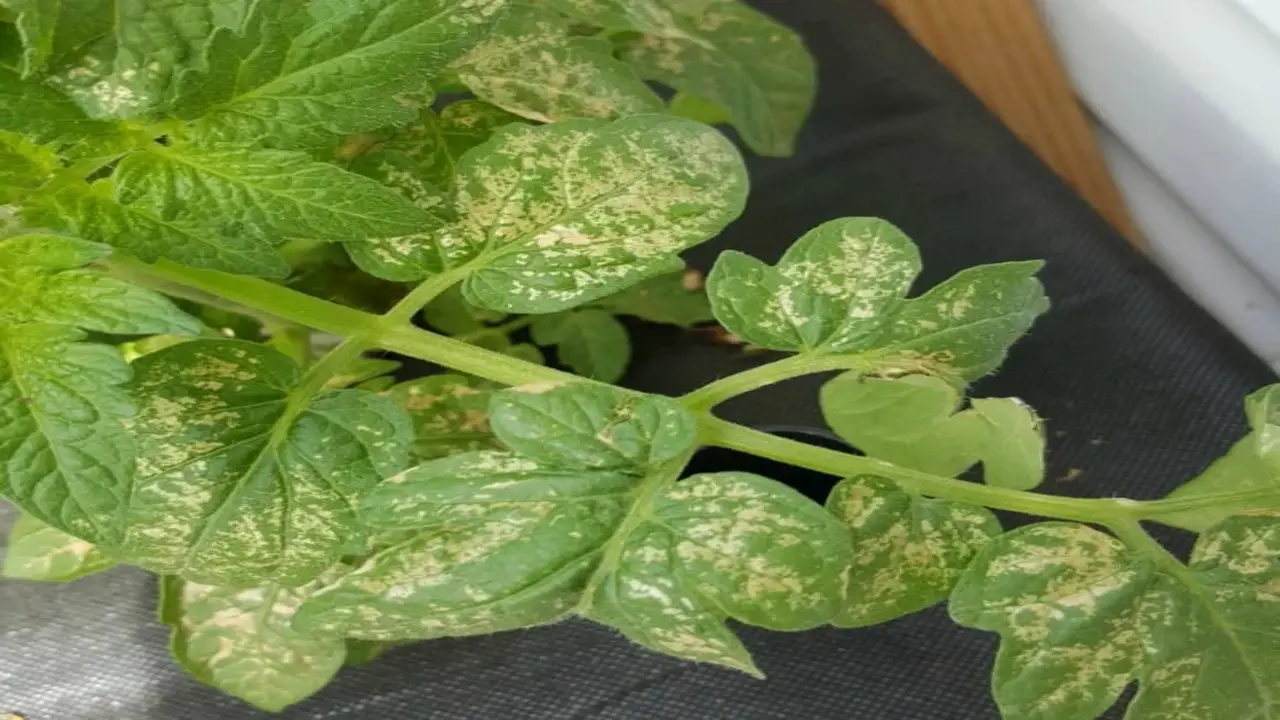
Excessive exposure to direct sunlight can cause basil leaves to turn black due to sunburn. Similarly, heat stress resulting from high temperatures or lack of water can also lead to blackened basil leaves. To prevent this, providing shade and ensuring adequate hydration is crucial.
Promptly removing blackened leaves promotes healthy new growth. Monitoring sun exposure and properly caring for the basil plant is vital in preventing blackening. Remember to check for moisture levels and protect the basil plant from extreme heat.
Nutritional Deficiencies And Imbalances In The Soil Affecting Basil Plants
Nutritional deficiencies in the soil can lead to blackened basil leaves. Imbalances in the soil’s pH levels can also affect the health of basil plants. A lack of essential nutrients like nitrogen, potassium, and magnesium can contribute to the blackening of basil leaves. Over-fertilization or incorrect application of fertilizers can result in nutrient imbalances in the soil. Regular soil testing and proper nutrient management prevent blackened basil leaves.
Tips For Preventing Blackened Basil Leaves
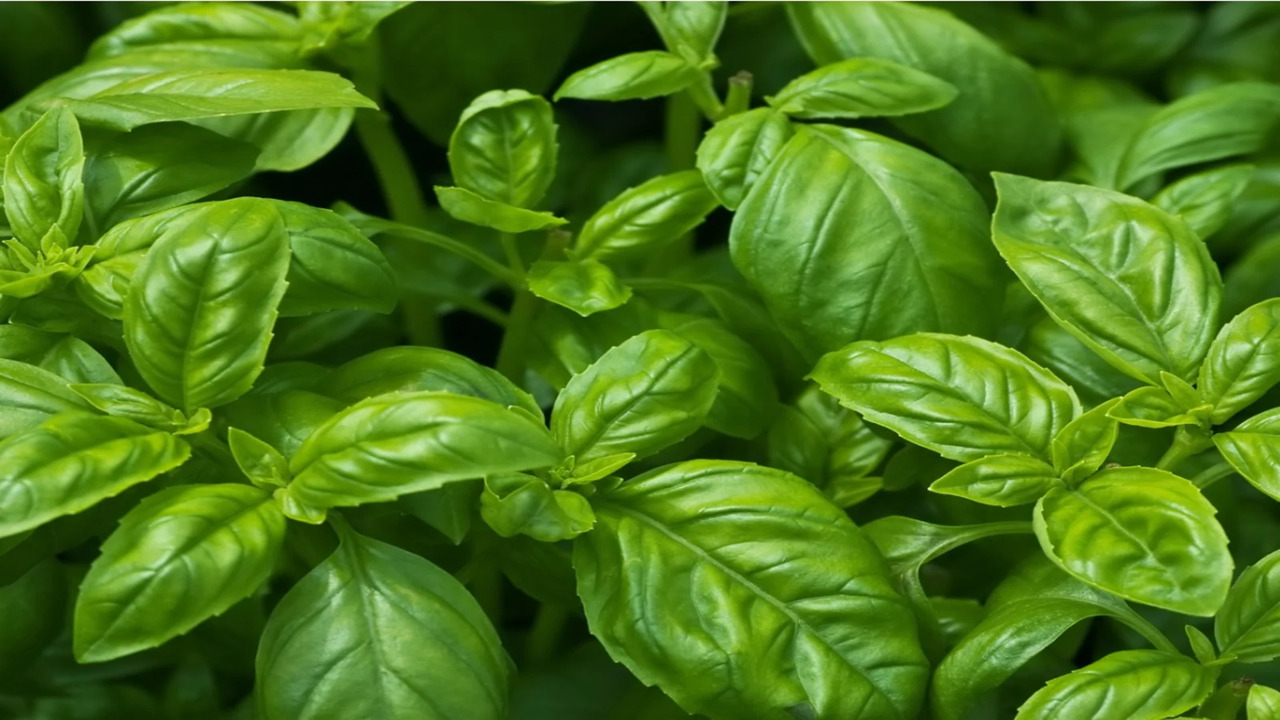
Basil leaves can turn black if exposed to extreme temperatures or smoke. Exposure to high temperatures or smoke can cause the leaves to lose their green color and become black, making them less flavorful. If your basil leaves have turned black, there are a few possible reasons why this may be happening. Here are some tips to help prevent blackened basil leaves:
- Proper watering: Overwatering or underwatering can cause stress to the basil plant and lead to blackened leaves. Ensure to water the plant consistently and avoid letting the soil become overly dry or waterlogged.
- Sunlight exposure: Basil plants require plenty of sunlight to thrive, but excessive exposure to intense sunlight can cause leaf burn and discoloration. Ensure that your basil plant gets the right sunlight for optimal growth.
- Pests and diseases: Blackened leaves can also signify pest infestation or disease. Look for common basil pests like aphids or fungal diseases like powdery mildew. Regularly inspect your plants and take appropriate measures if any issues are detected.
- Nutrient deficiencies: Basil plants need a balanced supply of nutrients to stay healthy. A lack of essential nutrients such as nitrogen, iron, or magnesium can lead to leaf discoloration. Consider using a well-balanced fertilizer to ensure your plants receive the necessary nutrients.
Following these tips can help prevent blackened basil leaves and ensure your plants remain vibrant and healthy.
Proper Watering Techniques For Basil Plants
Proper watering techniques for basil plants are crucial to prevent blackened leaves. Overwatering can lead to root rot, causing the leaves to turn black. On the other hand, underwatering can result in wilting and browning of the basil leaves.
It is important to strike a balance by providing enough moisture without waterlogging the soil. Consistent watering and checking the soil moisture level are essential for the health of basil plants. To prevent blackened leaves, use well-draining soil and allow the top layer to dry out between watering.
Disease Prevention And Control Measures For Basil Plants
Proper spacing and air circulation can help prevent fungal diseases in basil plants. Avoid overwatering and allow the soil to dry out between watering to prevent root rot. Regularly inspect the basil plants for signs of pests and take appropriate measures for control. Use a fungicide or organic disease control methods to treat fungal diseases if necessary. Remove any infected leaves or plants to prevent the spread of disease.
Pest Management Strategies For Protecting Basil Leaves
To protect your basil leaves from pests, it’s important to inspect the plants for any signs of infestation regularly. Take immediate action if you observe pests. Implement natural pest control methods, such as introducing beneficial insects or using organic insecticides.
Maintain the growing environment by providing adequate sunlight, water, and airflow to prevent pest infestations. Remove any damaged or infected leaves promptly to prevent the spread of pests and diseases. Consider companion planting with herbs or flowers that repel common basil pests.
Providing Adequate Shade And Protection From Extreme Temperatures
To prevent the blackening of basil leaves, it’s important to provide adequate shade and protection from extreme temperatures. Basil leaves can turn black due to sunburn or exposure to excessive heat. Providing shade during the hottest parts of the day can help protect the leaves from sunlight.
Using shade cloth or planting basil in a location with natural shade can also be effective. Protecting basil plants from strong winds and regularly monitoring soil moisture for adequate water supply can help them withstand high temperatures.
Maintaining Proper Soil Fertility For Healthy Basil Growth
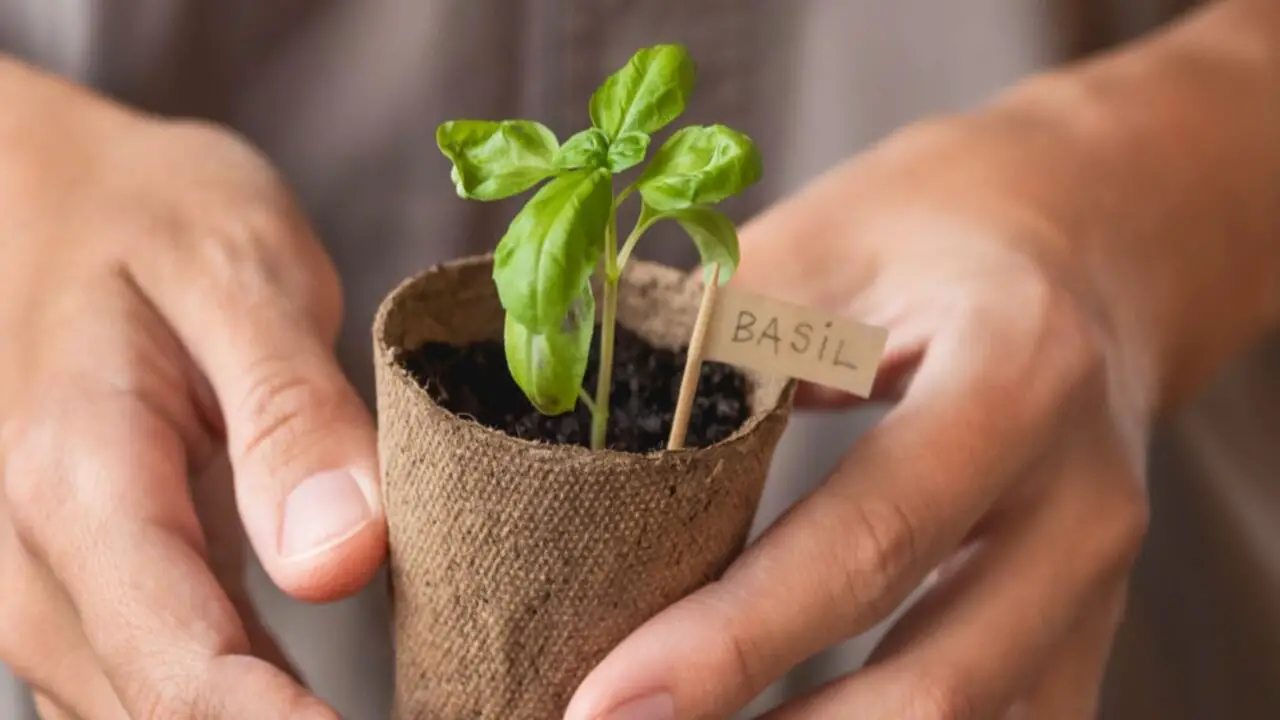
Maintaining proper soil fertility is essential for promoting healthy growth in basil plants and preventing the issue of blackened leaves. Imbalanced soil pH levels can contribute to leaf discoloration, so it’s important to ensure the pH is within the appropriate range for basil. Additionally, providing the necessary nutrients through organic compost or balanced fertilizers is crucial.
Overwatering and poor drainage can lead to root rot and blackened leaves, so it’s important to water the plants appropriately and ensure proper drainage. Regular soil testing helps identify any nutrient deficiencies and allows for adjustments in fertilization.
Conclusion
It is important to understand the potential causes and take preventive measures to prevent blackened basil leaves. Overwatering and poor drainage can lead to root rot and blackening of the leaves. Fungal diseases and pests can also affect the health of basil plants. Sunburn and heat stress can cause the leaves to turn black. Nutritional deficiencies in the soil can also impact the growth of basil.
To prevent these issues, water your basil plants properly, provide disease prevention and control measures, manage pests effectively, provide shade and protection from extreme temperatures, and maintain proper soil fertility. By following these tips basil leaves turned black, and you can ensure that your basil plants stay healthy and vibrant.
Frequently Asked Questions
1.Why Are My Basil Leaves Turning Black?
Ans: There are several reasons why basil leaves may turn black. Overwatering can lead to root rot, causing the leaves to darken. Fungal diseases like downy mildew and fusarium wilt can also cause blackening. Additionally, pests such as aphids and spider mites can damage the leaves, resulting in discoloration. Exposure to extreme temperatures or direct sunlight can also contribute to blackened basil leaves.
2.Is It Safe To Eat Basil That Has Turned Black?
Ans: It is not safe to consume basil that has turned black. Blackened leaves often indicate decay or fungal growth, leading to foodborne illnesses or digestive issues. To ensure food safety, it is best to discard any basil that has turned black.
3.How Do You Get Rid Of Black Mold On Basil?
Ans: To get rid of black mold on basil, start by removing the affected leaves. Avoid overwatering to prevent excessive moisture that promotes mold growth. Improve air circulation by spacing out plants or using a fan. Consider treating with a natural fungicide or a water and vinegar solution.
4.Are The Leaves And Stems Of Your Basil Suddenly Starting To Turn Black?
Ans: Several factors could be at play if you notice your basil leaves and stems turning black. Fungal diseases like downy mildew or bacterial leaf spot may be the culprits. Overwatering or waterlogged soil can also cause blackening. Lack of sunlight and poor air circulation contribute as well. Prevent blackening by properly watering, ensuring adequate sunlight, and maintaining good air circulation.
5.What Can I Use To Help Remove The Blackened Leaves On My Basil Plant?
Ans: To help remove blackened leaves on your basil plant, you can try a few things. If it’s a fungal disease, use an edible plant fungicide. Make sure your plant has proper drainage to prevent overwatering. Remove severely affected leaves and dispose of them to prevent further spread.

I’m a writer and blogger who loves to talk about entertainment, culture, and relationships. I love to share my thoughts and insights on these topics, and I’m always looking for new ways to engage with my readers. I’m also a big fan of learning new things, so I’m always exploring new areas of interest.
